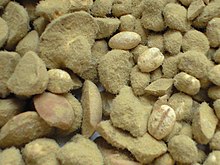| Aspergillus sojae | |
|---|---|

| |
| Soy sauce koji consisting of soy bean and wheat cultured with Aspergillus sojae | |
| Scientific classification | |
| Domain: | Eukaryota |
| Kingdom: | Fungi |
| Division: | Ascomycota |
| Class: | Eurotiomycetes |
| Order: | Eurotiales |
| Family: | Aspergillaceae |
| Genus: | Aspergillus |
| Species: | A. sojae |
| Binomial name | |
| Aspergillus sojae Sakag. et K.Yamada ex Murak. 1971 | |
| Varieties | |
|
Aspergillus sojae var. gymnosardae | |
| Synonyms | |
|
Aspergillus sojae Sakag. & K. Yamada 1944
| |
Aspergillus sojae is a species of fungus in the genus Aspergillus.
In Japan, it is used to make the ferment (kōji) of soy sauce, miso, mirin, and other lacto-fermented condiments such as tsukemono. Soy sauce condiment is produced by fermenting soybeans with A. sojae, along with water and salt.
Glyceollins, molecules belonging to the pterocarpans, are found in the soybean (Glycine max) and have been found to have an antifungal activity against A. sojae.
Aspergillus sojae contains 10 glutaminase genes. The glutaminase enzyme in A. sojae is important to the taste of the soy sauce that it produces.
An experiment was conducted using the genome sequencing of A. sojae. Strain NBRC 4239 had been isolated from the koji used to prepare Japanese soy sauce. The sequencing technology was used to investigate the genome with respect to enzymes and secondary metabolites in comparison with other Aspergillus species sequenced. The A. sojae NBRC4239 genome data will be useful to characterize functional features of the koji molds used in Japanese industries.
See also
References
- Leboffe, Michael J.; Pierce, Burton (2006). Microbiology: Laboratory Theory and Application (2nd ed.). Morton. p. 317. ISBN 978-0-89582-708-1.
- Kim HJ, Suh HJ, Lee CH, Kim JH, Kang SC, Park S, Kim JS (September 2010). "Antifungal activity of glyceollins isolated from soybean elicited with Aspergillus sojae". Journal of Agricultural and Food Chemistry. 58 (17): 9483–7. doi:10.1021/jf101694t. PMID 20666365.
- Ito K, Hanya Y, Koyama Y (October 2013). "Purification and characterization of a glutaminase enzyme accounting for the majority of glutaminase activity in Aspergillus sojae under solid-state culture". Applied Microbiology and Biotechnology. 97 (19): 8581–90. doi:10.1007/s00253-013-4693-4. PMID 23339014. S2CID 16513388.
- Sato A, Oshima K, Noguchi H, Ogawa M, Takahashi T, Oguma T, Koyama Y, Itoh T, Hattori M, Hanya Y (June 2011). "Draft genome sequencing and comparative analysis of Aspergillus sojae NBRC4239". DNA Research. 18 (3): 165–76. doi:10.1093/dnares/dsr009. PMC 3111232. PMID 21659486.
| Taxon identifiers | |
|---|---|
| Aspergillus sojae | |
This Eurotiomycetes-related article is a stub. You can help Misplaced Pages by expanding it. |